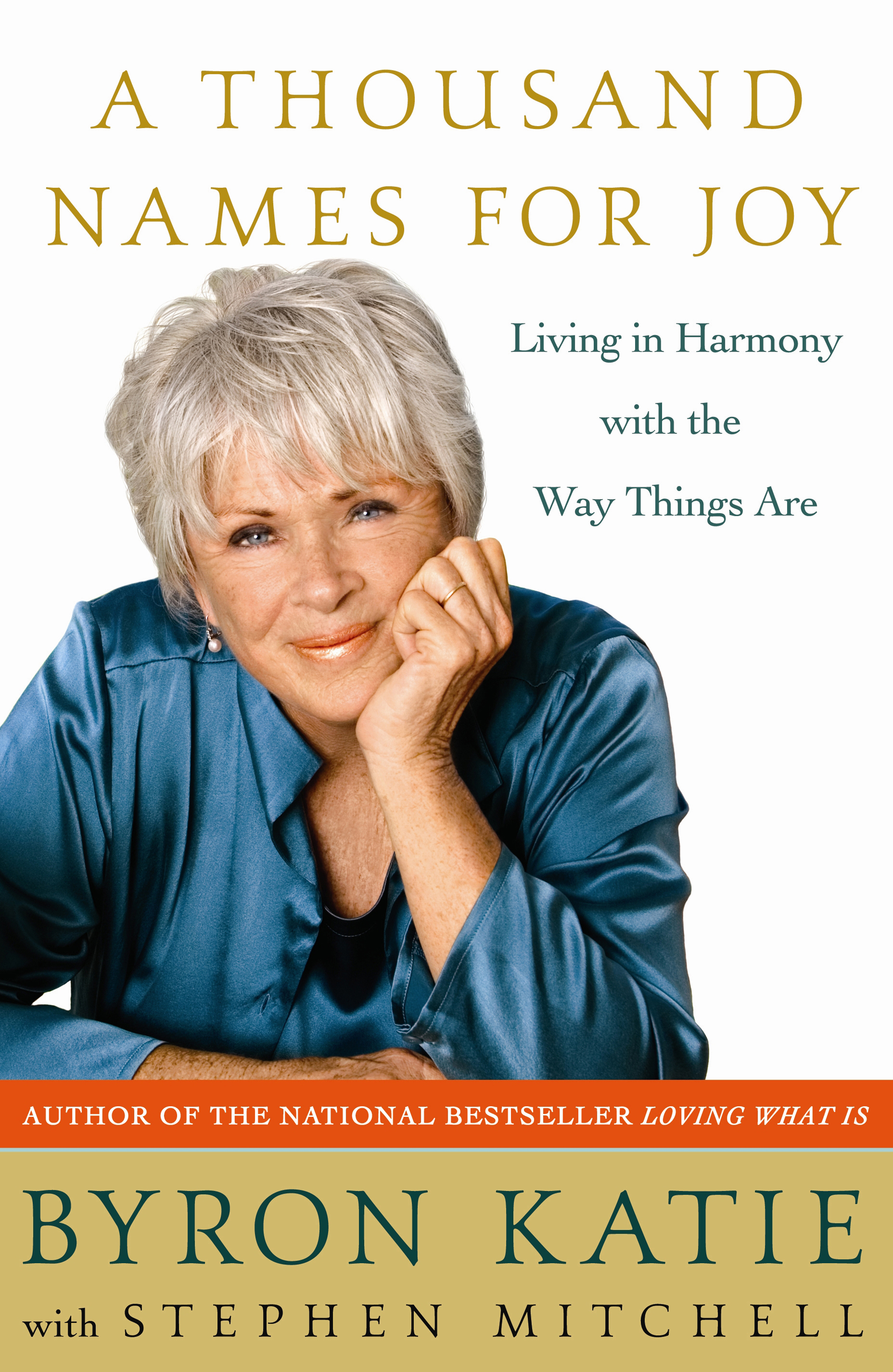- AFRIKAANS | Afrikaans
- العربية | Arabic
- CHICHEWA | Chichewa
- 简体中文 | Chinese, Simplified
- 繁體中文 | Chinese, Traditional
- ČEŠTINA | Czech
- DANSK | Danish
- DEUTSCH | German
- EESTI | Estonian
- ΕΛΛΗΝΙΚΑ | Greek
- ENGLISH | English
- ESPAÑOL | Spanish
- فارسی | Farsi
- FRANÇAIS | French
- 한국어 | Korean
- עברית | Hebrew
- HRVATSKI | Croatian
- ITALIANO | Italian
- LATVIESU | Latvian
- LIETUVIU | Lithuanian
- MAGYAR | Hungarian
- македонски | Macedonian
- NEDERLANDS | Dutch
- 日本語 | Japanese
- NORSK | Norwegian
- PAPIAMENTU | Papiamentu
- POLSKI | Polish
- PORTUGUÊS | Portuguese
- ROMÂNĂ | Romanian
- РОССИЯ | Russian
- SHQIP | Albanian
- SLOVENČINA | Slovak
- SLOVENŠČINA | Slovenian
- SRPSKI | Serbian
- SUOMI | Finnish
- SVENSKA | Swedish
- TÜRKÇE | Turkish
- ייִדיש | Yiddish
Testimonial: A Thousand Names for Joy by Byron Katie

When I first started reading , A Thousand Names for Joy, I didn’t expect to like it. But very quickly I got swept up by Katie’s simplicity, love, and clarity. It rolled out like music, like variations on a theme—the same basic realization expressed in so many ways, and under so many varying circumstances. As I read on, I found that I wasn’t being “educated” about the awakened mind, I was seeing it in action, I was feeling it. It was amazingly personal. For me it was a transmission, which is much more valuable than any explanation could be. In the end, I was blown out by this book. It is the most incredible teaching I’ve ever read.
Katie’s Work is absolutely different from anyone else’s. Most self-help books aren’t really about anyone’s “self” except the author’s. They provide you with their ideas about how you can be happy, and these ideas are supposed to work for everyone. But instead of offering a one-size-fits-all strategy, Katie has shown me how to craft my own solutions, under any and all circumstances. The value of this can’t be overstated.
In addition to helping me with problems after they’ve arisen, The Work showed me how to stop the problems from arising in the first place. I’ve learned that the way to counterbalance difficult emotions is not necessarily to explore or analyze them, but to catch them as they present themselves, question their validity, and then simply let them go. Once I examine any thought whatsoever, I’m struck by what it really, truly is in the first place: a thought. A thought has no bearing on reality. If you’re suffering from a broken heart, for example, when you look, you see that your heart is not really broken. No matter how hard you try, you literally cannot find a broken heart. There is only the thought that a broken heart exists. The funny thing is that if you stop believing that thought, the heartbreak also stops—not because you’ve healed it, but because it was never there in the first place.
It can be difficult to believe that it’s this simple, but it is. Most self-help strategies are detailed commentaries on complex psychological or spiritual theories. But Katie’s suggestions are almost pre-psychology and even pre-spirituality. They’re about how the mind naturally works, no matter how you were raised or what you believe. She helps you step off the merry-go-round of newer, better, perkier self-help strategies and instead relate plainly and directly to your life as it is, without a lot of drama. It’s so incredibly practical.
Katie’s emphasis on self-inquiry shines a light on the present moment, something all spiritual teachers tell us we should do. However, they usually don’t tell you how. But Katie does. She taught me how to set aside my beliefs and philosophies about what is going on and instead relate to what is going on. That’s pretty deep when you think about it, but it also may be the reason you may not understand the power of her work right away. It’s so stripped down and essential. It’s not a system of belief, and we’re not used to things that aren’t assigned to a particular school of thought. But because it’s a living tool (not a system or belief), it’s always relevant and can be customized to meet any situation.
One way this has shown up for me is with my husband. Even though I don’t always succeed (ahem), I’ve learned how to separate my projections about who he should be and how I need him to act from who he really is. It actually strikes me as funny to realize that until I could do this, I was probably having a relationship with my thoughts about my husband instead of a relationship with him. I like him much better than I like my thoughts about him.
Like Katie’s self-inquiry, the Tao Te Ching is not a checklist of actions you can take that will solve all your problems. Instead, it’s an uncannily accurate description of how reality works and what the mind responds to. Just as our Western scientists have mapped and catalogued the physical world, the Tao Te Ching explains human nature. What Katie and the Tao Te Ching have in common is that both explain how to step out from behind the veil of calcified belief systems and instead meet your world directly. Both explain how the mind works when left to its own devices and that if we can just get out of the way, its natural wisdom will reassert itself and provide exactly the right solution in all cases.
S.P.
For more information and upcoming events, visit thework.com
